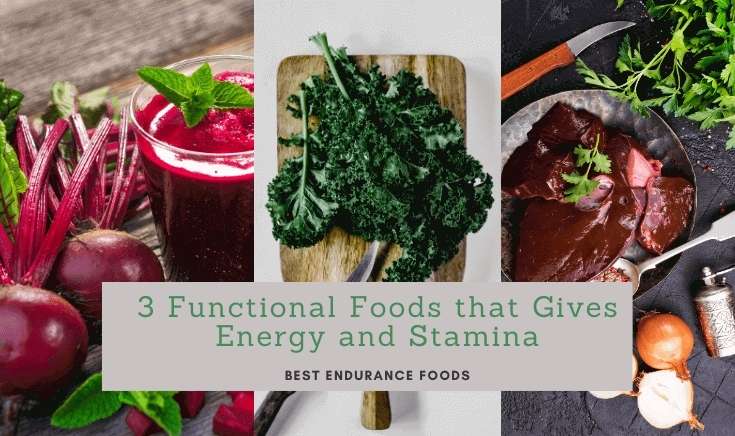Fuelling your body with the right energy and endurance supplements is crucial for maximising your performance as an endurance athlete. While it’s important to follow a well-structured nutrition plan that already includes sufficient carbohydrates, protein, and hydration, there are specific foods that can further enhance your performance and stamina. It is important to note that these foods should be seen as valuable additions to, the basics of a well-rounded nutrition plan.
Eating a diverse range of foods, “eating a rainbow a day,” is the best way to ensure that your body receives an abundant supply of all the necessary nutrients for endurance athletes. This allows your body to perform optimally, recover effectively, and develop muscle tissues after each endurance training session.
Nutrient deficiencies are a common cause of premature fatigue, particularly when it comes to a decrease in red blood cell production and oxygen transport. This reduction in red blood cells and oxygen transport can result in decreased oxygen availability and impaired transport of nutrients to the working muscles, ultimately affecting energy production.
Iron, copper, vitamin A, B6, B9, and B12 all play a crucial role in the production of red blood cells and oxygen transport. Therefore, it is important to regularly include these nutrients in the diets of endurance athletes to support optimal performance.
There are three foods that can serve as excellent supplements for endurance athletes, promoting the delivery of oxygen and nutrients to maximize performance:
Three Complementary Foods to enhance Energy and Stamina
1. Liver
Protein-rich foods like seafood, poultry, and red meat, particularly liver, are known for their high iron content and are great additions to an endurance athlete’s diet.
Iron comes in two forms: heme and non-heme iron. Heme iron, found in meat, is better absorbed by the body compared to non-heme iron from plant-based sources. Therefore, consuming meat enhances the availability of haemoglobin production, the protein in red blood cells responsible for transporting oxygen around the body.
Among various red meats, liver stands out as significantly richer in micronutrients that contribute to the production of red blood cells and haemoglobin (See table below). Including one to two servings of liver per week is an effective way to supply your body with these essential nutrients and promote energy metabolism.
It is worth noting that there is little difference in nutrient content among different types of liver, so choose the animal’s liver that you prefer to eat.
|
Nutrient |
Red Meat (100g) |
Beef Liver (100g) |
|
Iron |
3.3 mg |
8.8 mg |
|
Copper |
.18 mg |
12.0 mg |
|
Vitamin A |
40 IU |
30,400 IU |
|
Vitamin B6 – Pyridoxine |
.07 mg |
.73 mg |
|
Vitamin B9 – Folic Acid |
4.0 mcg |
145.0 mcg |
|
Vitamin B12 – Cobalamins |
1.84 mcg |
111.3 mcg |
2. Kale
Dark leafy green vegetables, such as kale, are excellent sources of non-heme iron and other nutrients crucial for red blood cell production.
While heme iron-rich foods are more readily absorbed by the body, individuals who do not consume meat or fish, such as vegetarians, must include alternative food sources in sufficient amounts to meet their endurance sports nutrition needs.
Kale is an excellent option that should be regularly incorporated into your weekly meals. It is rich in vitamins A and B6, copper, and can provide a protein boost with just 50kcal per 100g. Additionally, kale is a great source of vitamin C, which enhances the absorption of non-heme iron.
3. Beetroot
Beetroot has gained popularity as a food that enhances performance. Nitrates present in foods like beetroot have been strongly linked to improved endurance performance, particularly in the form of juice or highly concentrated shots.
This is because beetroots are naturally rich in nitrates, which are converted into the signalling molecule nitric oxide. Nitric oxide acts as a vasodilator, allowing for a more efficient delivery of oxygen to the working muscles.
Apart from its role in enhancing blood flow, beetroot contains other nutrients that support healthy blood cell production. It is also a great source of vitamin B9, copper, and various other nutrients. Notably, both the root and leaves of beetroot offer similar nutritional properties to kale, including iron, vitamins A, and C.
Supplementing the Basics
In addition to these specific foods, there are a few essential supplements that endurance athletes should consider:
Iron:
A lack of iron in your diet can result in reduced red blood cell count, and iron deficiency anaemia, potentially causing, fatigue, lack of energy, and poor athletic performance.
Red meat is a rich source of heme iron, which is more easily absorbed, while plant-based sources like beans, nuts, dried fruits, spinach, and broccoli contain non-heme iron.
However, indiscriminate use can lead to risks like toxicity and adverse effects. Individualised testing is necessary to assess iron status and determine the need for supplementation. A well-balanced diet with iron-rich foods is generally recommended. Before taking any iron supplements, it is recommended to consult with your doctor.
Vitamin C:
This vitamin boosts the immune system, protects against infections, and enhances iron absorption. However, excessive intake through supplementation can have limited benefits and potential risks. It is generally recommended for athletes to meet their vitamin C needs through a well-balanced diet that includes fruits and vegetables. Whole foods provide a wide array of beneficial compounds that work synergistically, whereas isolated vitamin C supplements may not offer the same advantages.
Multivitamin:
The benefits and necessity of multivitamins for endurance athletes are subject to scrutiny. While multivitamins can provide essential nutrients, their impact on performance is not well-established. Athletes who maintain a balanced diet can usually meet their nutrient needs without supplementation. Excessive intake of certain vitamins or minerals through multivitamins can lead to imbalances or toxicity. It is recommended to prioritise a varied diet of whole foods and undergo individualized nutritional assessments to identify specific deficiencies. However, where there are known nutrient deficiencies, taking a multi-vitamin can be valuable.
Beetroot shots:
The inclusion of beetroot shots in your nutrition regimen may be an efficient way to incorporate beetroot into your diet for endurance athletes, although this is up for debate. While beetroot juice is known to contain nitrates that have the potential to enhance exercise performance, the necessity of regularly consuming beetroot shots remains a matter of debate. The impact of beetroot shots on endurance athletes is greatly individualised, with some individuals experiencing limited or no noticeable benefits. Furthermore, alternative dietary approaches, such as maintaining a well-rounded diet consisting of whole grains, lean proteins, and a variety of fruits and vegetables, can provide comparable advantages in terms of recovery. It is also important to consider individual preferences, taste, and the potential for gastrointestinal discomfort when consuming beetroot shots.
Protein:
Adequate protein intake is crucial for growth, development, and repair of muscles and other tissues in the body, including bones and tendons.
Protein-rich foods like meat, fish, eggs, dairy, tofu, and beans should be regularly consumed. What about protein shakes? Protein shakes can be a convenient option to meet protein requirements.
Carbohydrates
Carbohydrates hold significant importance for endurance athletes, serving as a cornerstone of their nutrition. Carbohydrates offer several benefits. Firstly, carbohydrates serve as the primary source of energy, fuelling athletic performance and aiding in the delay of fatigue, thereby enhancing endurance capacity. Additionally, they play a pivotal role in supporting immune function, which can be temporarily compromised by intense training. By ensuring an adequate carbohydrate intake, athletes can bolster their immune system, reducing the susceptibility to illnesses. Furthermore, carbohydrates contribute to the maintenance of bone health by facilitating the production of insulin-like growth factor and aiding in calcium absorption. It is crucial for endurance athletes to prioritise a well-balanced diet, ensuring an appropriate carbohydrate intake to support their energy needs, immune system, and bone health. There are two main types of carbohydrates.
Sugars:
Sugars are comprised of small molecular structures, making some easier to digest and providing immediate energy just before and during exercise. However, these fast-digesting carbs can have a significant impact on blood sugar levels and energy levels due to their fast digestion rate. Consuming excessive amounts of sugars can lead to sluggishness. However, not all simple carbs are fast-digesting, some comprise of being slow-digesting e.g., lactose (dairy sugar) and fructose (fruit sugar). So, while quickly digesting sugars can be effective for quick energy sources before and during endurance training (e.g. white bread & jam, dates, fruit juices, energy bars, sugary sweets), they should not be prioritised over more fibrous, complex carbohydrates in your daily diet.
Carbohydrate drinks, gels and chews are also a convenient way endurance athletes can effectively restore glycogen levels and rapidly fuel their energy needs during prolonged periods of exercise.
Complex Carbs (starches):
The term ‘complex carbs’ is often used to describe foods, structured as chains of sugar molecules, containing starches, fibre, and other nutrients, e.g., whole grains and brown rice. However, it may be more accurate to refer to these carbohydrates as ‘unrefined’ rather than ‘complex.’ Unrefined carbohydrates, including whole grains, provide important nutrients and fibre and are an essential part of a healthy diet and should be included in the diets of marathon runners, being slow digesting, to provide a steady supply of energy throughout the day and promoting good gut health.
However not all complex carbs are slow digesting. There are many starches which are just as fast as sugars in terms of how quickly they are digested for energy e.g., Maltodextrins.
Also, Learn about recommended carbohydrate intake for athletes
In summary, the idea that sugars are always fast, and starches are always slow digesting is a misconception. The digestion and impact on blood glucose levels vary depending on the specific type of sugar or starch. It is important to emphasise having a balanced diet and prioritising unrefined carbohydrates for overall health.
By incorporating these specific foods and understanding the importance of sufficient carbohydrates, protein, and hydration in your nutrition plan, you can optimise your endurance performance and stamina as an athlete. Remember, the three highlighted foods should complement the basics of a well-structured nutrition plan rather than replace them.
Recommended: Nutrition Workshops For Athletes
FAQs:
What are complex carbs?
Generally, complex carbs are rich in fibre and provide a steady rise in blood sugar levels. As a result, complex carbs help to provide a steady supply of energy throughout the day.
What are simple carbs?
Simple carbs are made up of shorter chains of molecules and are quicker to digest than complex carbohydrates, providing a more immediate energy source just before and during exercise.
what food should endurance athletes eat?
Endurance athletes need plenty of carbohydrates and protein throughout the day to support their training and recovery. Additional foods such as beetroot for nitrates, liver for iron and kale for many vitamins further promote health and energy.






